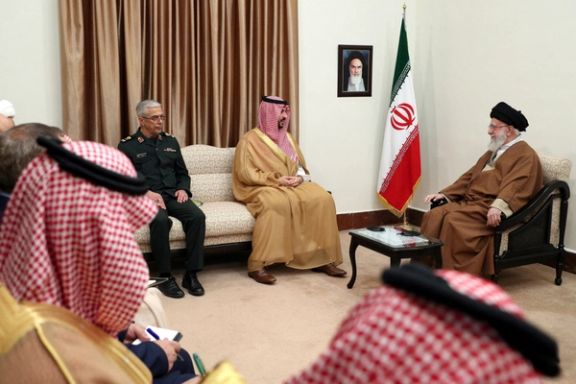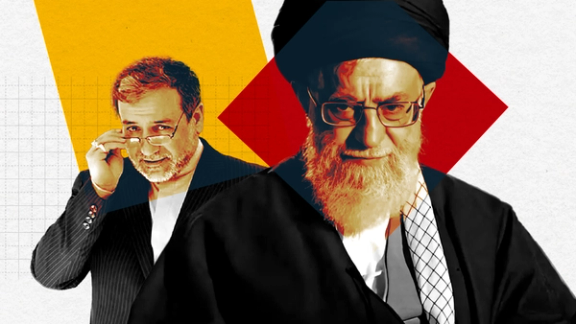Related Articles
The Trump administration risks falling into a familiar pattern of concessions and extended negotiations with Iran over its nuclear program, potentially repeating the missteps of the Obama and Biden administrations, according to an opinion piece published by Dispatch.
Despite President Trump's tough rhetoric and military threats, his Iran strategy risks repeating past administrations' mistakes of softening demands, wrote Jonathan Ruhe, foreign policy director at the Jewish Institute for National Security of America.
Drawing parallels to the Obama era, Ruhe said that initial strong demands for Iran to dismantle its nuclear program and to accept intrusive inspections eventually gave way during the negotiations that led to the 2015 Joint Comprehensive Plan of Action (JCPOA).
The author added that Iran is exploiting the US willingness to prioritize diplomacy, using it as leverage to extract concessions and undermine American military threats.
Ruhe argues that the Trump team appears to be falling into the same trap, with Iran employing familiar tactics of seeking drawn-out indirect talks and interim arrangements while insisting on US guarantees and rejecting demands that contravene Khamenei's red lines.
Iran's renewed engagement in nuclear talks with the United States is likely a survival tactic driven by economic, geopolitical, and social pressures, rather than a fundamental shift in strategy, according to an analysis by Oded Ailam of the Jerusalem Center for Security and Foreign Affairs (JCFA).
Ailam, a former head of the Counterterrorism Division in the Mossad, pointed out the critical expiration of key provisions of the 2015 nuclear agreement in October 2025.
These "Sunset Clauses" include the end of restrictions on Iran's ballistic missile program, the ban on advanced uranium enrichment technology development, and limits on civilian nuclear trade.
The analysis warns that if these clauses expire without a new arrangement, Iran will face no significant legal barriers to developing a military nuclear infrastructure within weeks. This scenario, Ailam argues, could trigger a dangerous nuclear arms race in the Middle East, prompting countries like Saudi Arabia, the UAE, Turkey, and Egypt to pursue their own independent nuclear programs.
Drawing a parallel to a Persian proverb about muddying waters to catch fish, Ailam suggests Iran's negotiation method involves exhausting and obscuring, rather than seeking quick agreement.
Touraj Atabaki, a senior researcher at the International Institute of Social History, says analyzing China's role in the negotiations between Tehran and Washington is simpler than analyzing Russia’s approach.
“China wants the Red Sea waterway to remain a steady route for its growing trade, and is currently pleased that, thanks to the efforts of the United States, the Houthis' activities have decreased," he told Iran International.
Atabaki added, “China is very eager that Iran-US negotiations can prevent a potential Israeli or American war against the Islamic Republic, so that its relationship with the Persian Gulf countries can progress, and along with that, the famed and historic Silk Road can reach a successful outcome.”
Saudi Arabia's stance on negotiations with Iran over its nuclear program has shifted significantly in the past decade, moving from opposition to support as regional dynamics and the kingdom's priorities evolve, according to an analysis by the New York Times.
The writer pointed out that ten years ago, Saudi officials criticized the deal struck by former US President Barack Obama as weak and empowering Iran. However, it added, as a second Trump administration engages in talks with Iran on a potentially similar agreement, Saudi Arabia has expressed hope for a positive outcome, emphasizing the importance of regional stability.
The Riyadh-based writer, Vivian Nereim, attributed this change to several factors, including improved Saudi-Iranian relations and Saudi Arabia's ambitious economic diversification plans, which are threatened by regional tensions and potential conflict.
After years of severed ties, including a complete break in 2016, Iran and Saudi Arabia announced a formal reconciliation in 2023, with China mediating the detente.
The analysis concludes that Iran's increased regional outreach and the shared interest in avoiding escalation have contributed to the Persian Gulf states' support for the ongoing negotiations.
Earlier in the day, Alireza Enayati, Tehran's ambassador to Riyadh, said Saudi Arabia has a positive view of Iran's negotiations.

Oman has long served as a discreet and trusted intermediary between Tehran and Washington. Its role dates back to the early 2010s, when Muscat hosted secret backchannel talks that ultimately led to the 2015 nuclear deal (JCPOA).
The United States also sees Oman as a discreet and stable mediator with a history of hosting secret talks with Tehran.
Continue reading the analysis here.

